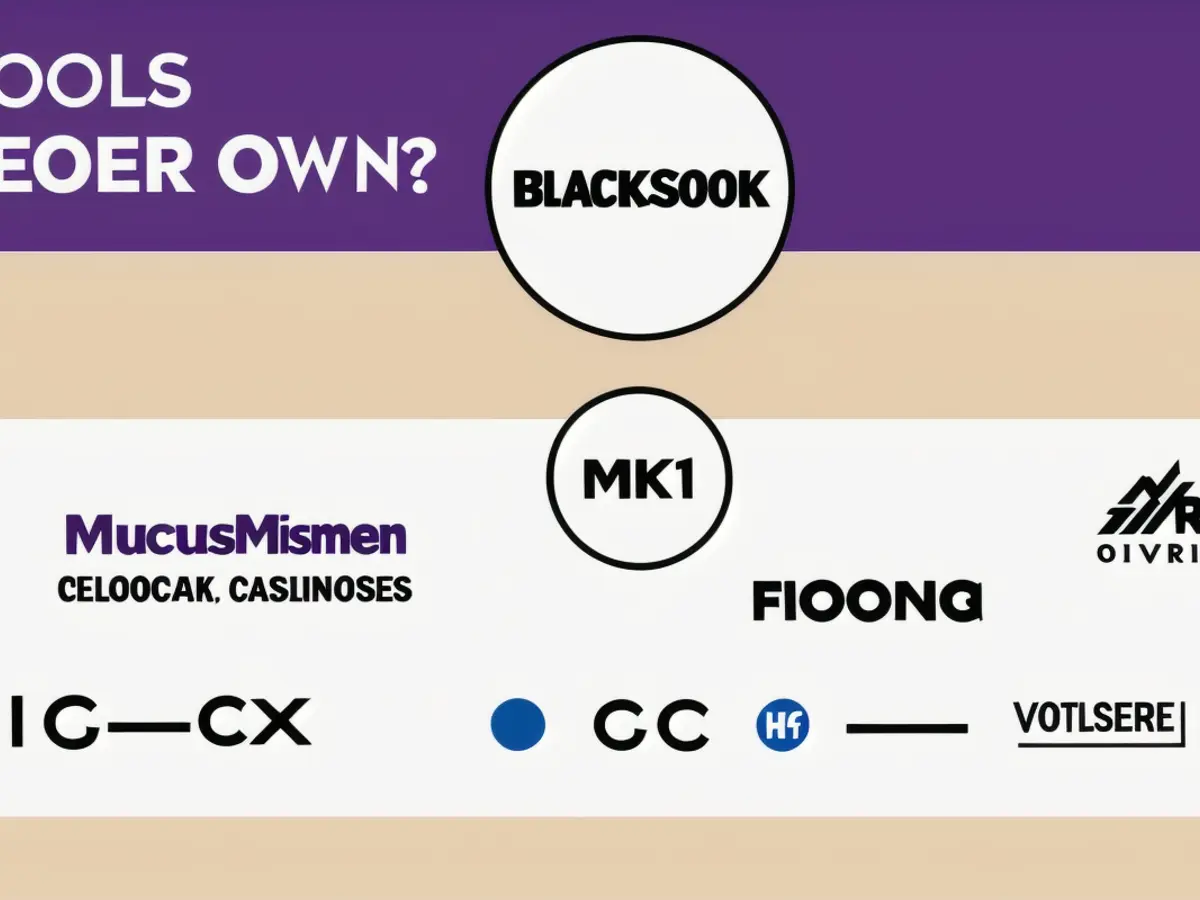Which Businesses Does BlackRock Control?
BlackRock (NYSE:BLK) is a renowned global investment management firm that concludes 2023 with an astonishing $10 trillion in assets under management (AUM). These assets vary from shares in prominent publicly traded corporations, individual homes, and essential infrastructure assets like pipelines. BlackRock is responsible for managing these assets for their clients, which can be retail, institutional, or exchange-traded fund (ETF).
There exists a lot of confusion regarding what BlackRock does and the entities it controls. At its core, BlackRock is an asset management company, meaning it manages assets on behalf of those who own them. Consequently, despite BlackRock's funds holding significant stakes in large worldwide corporations, the actual investors in those funds retain ownership of those companies' equity interests, not BlackRock. By the end of 2023, BlackRock's balance sheet holds an impressive $123 billion. However, the company's direct equity investments from its balance sheet into other companies it does not own amount to a modest $9.7 billion. Moreover, BlackRock contributes its balance sheet capital to seed new funds and co-invests in others, albeit these investments are relatively small.
To unravel some misapprehensions about BlackRock, let's look at some of the corporations it possesses, as well as potential acquisitions. A clear comprehension of what BlackRock owns and does aids investors in evaluating whether they wish to invest in its stock.
Corporations BlackRock Owns
What corporations does BlackRock hold shares in?
To enhance its investment management capabilities, BlackRock has acquired numerous companies over the years. Here's a glance at some of the companies it now manages:
1 - 3
1. Merrill Lynch Investment Management
BlackRock purchased Merrill Lynch Investment Management in 2006 for $9.7 billion to augment its retail and international investment management capabilities. At the time, the acquisition created one of the largest investment management firms, boasting almost $1 trillion in AUM.
2. Barclays Global Investor
BlackRock procured Barclays Global Investor (BGI), the investment management arm of British bank Barclays (BCS -1.12%), in 2009 for $13.5 billion. The transaction transformed BlackRock into the world's leading asset manager, doubling its AUM to $2.7 trillion.
As part of the agreement, BlackRock acquired the popular exchange-traded fund (ETF) platform iShares. By 2024, the platform oversees more than $3.3 trillion in AUM across 1,400 ETFs. Its largest ETF, the iShares Core S&P 500 ETF (NYSEMKT), boasts more than $450 billion in AUM, making it the second-largest ETF by AUM globally.
3. First Reserve Infrastructure Funds
Blackrock bought the energy infrastructure franchise of First Reserve in 2017 for an undisclosed sum. Acquiring First Reserve Infrastructure Funds expanded BlackRock’s Real Assets platform to $36.5 billion in client assets.
4 - 6
4. Kreos Capital
BlackRock acquired private debt manager Kreos Capital for $400 million in 2023. The company serves as a prominent provider of growth and venture debt funding for companies in the healthcare and technology sectors. The acquisition bolstered BlackRock's leading global credit asset management capabilities, allowing it to offer clients private market investment products and solutions.
5. eFront
BlackRock bought eFront in 2019 for $1.3 billion. The acquisition strengthened the company's technology platform.
6. Aperio Group
BlackRock acquired Aperio in 2021 for about $1.1 billion. Aperio specializes in customizing tax-optimized index equity separately managed accounts (SMAs). It designs and manages personalized public equity portfolios for clients.
Asset Management
A service provided by financial institutions to administer clients' financial assets. Many asset managers select investment strategies to manage a client's assets.
Other Investments
Besides wholly-owned companies, BlackRock has made strategic minority investments, including:
- Acorns: BlackRock invested in the microinvesting app in 2018. The company has expanded its partnership and investment in Acorns over the years, becoming its leading investor.
- iCapital: BlackRock increased its stake in the leading technology platform for alternative investments in 2020. It now holds the most substantial minority stake in the company.
Potential Future Investments
Which corporations could BlackRock buy in the future?
BlackRock is an active acquirer and consistently makes strategic acquisitions to amplify its investment management platform. In 2024, the company has agreed to acquire two more companies:

- SpiderRock Advisors: BlackRock agreed to purchase the remaining equity interest in SpiderRock Advisors in early 2024, following its initial minority investment in 2021. SpiderRock enhances the company's ability to offer personalized SMAs, which is one of the fastest-growing product segments in the United States' wealth industry.
- Global Infrastructure Partners (GIP): The company agreed to buy leading infrastructure fund manager GIP in early 2024 for $12.5 billion, including $3 billion in cash. The transaction will generate a market-leading, multi-asset class infrastructure investing platform with more than $150 billion in AUM.
Even after sealing those business agreements, BlackRock retains substantial financial leeway to acquire additional enterprises. At year-end 2023, the company held $8.7 billion in cash reserves versus $7.9 billion in debt, bolstering its robust credit ratings of AA-/Aa3. Furthermore, the organization anticipates financing the GIP deal through additional borrowing, a task it can handle effortlessly. This leaves ample financial wiggle room for further acquisitions, particularly since it can employ its shares as a currency for funding deals, such as in the case of the GIP acquisition's main financing source.
Following two early-2024 investments, BlackRock may pause before engaging in another business acquisition due to the need to assimilate the GIP transaction. However, once prepared, it will retain the financial flexibility to keep purchasing companies.
BlackRock follows a clear investment strategy for non-organic growth. It will pursue tactical acquisitions to expand its operational capabilities and strategic minority investments in potential acquisition targets.
As shown by the slide, BlackRock has systematically beefed up its alternatives investment capabilities (i.e., private equity, private credit, real estate, venture capital, and infrastructure) through several acquisitions. This trend continued in 2024 with the GIP acquisition agreement. Observing the investment manager acquire more companies in the alternatives sector would not come as a surprise.
The anticipated expansion in the alternatives sector's AUM has fueled this outlook. Per Preqin's forecast, the alternatives industry is projected to gain $8 trillion in AUM by 2028, reaching $24.5 trillion. The private credit sector is projected to double to $2.8 trillion in AUM by 2028. The financial instability in the banking sector is causing smaller banks to curtail lending (particularly for commercial real estate), paving the way for private credit funds to step in and fill the void.
BlackRock may capitalize on this alternative sector growth by acquiring a company like Carlyle Group (CG -2.13%) or Apollo Global Management (APO -2.35%). This would help it better compete against leading alternative asset managers like Blackstone (BX -1.39%), Brookfield Asset Management (BAM -1.32%), and KKR (KKR -1.74%). Apollo boasts an asset management business with $651 billion in AUM and a retirement services company (Athene). It is the leader in alternative credit, investment-grade alternative credit, and U.S. annuity sales. Meanwhile, Carlyle Group concluded 2023 with $426 billion in AUM across private equity, private credit, and investment solutions.
Retail investors, especially high-net-worth individuals, are driving the growth in alternatives by increasing their portfolio allocation to alternative investments. This could prompt BlackRock to look into acquiring a technology-centric startup that caters to retail investors, such as CrowdStreet, EquityMultiple, Fundrise, or YieldStreet. These companies offer private real estate, private credit, venture capital, and other alternative investment opportunities to individual investors. BlackRock might begin by making a strategic minority investment in the space, eventually leading to an acquisition.
BlackRock has embarked on this path in the past. It made a minority investment in SpiderRock in 2021 and agreed to acquire the remaining stake in 2024. It maintains several strategic minority investments, including iCapital and Acorns. BlackRock boosted its stake in iCapital in 2020 to become its primary minority investor and has done the same with Acorns. It could eventually secure the remaining shares in these companies.
Related investing topics
Understanding Asset Allocation for Your Portfolio
Balancing risk and reward is the cornerstone of an effective portfolio.
What is a Fiduciary?
A fiduciary is someone responsible for managing someone else's money, assets, or property.
ETF vs. Index Fund: What Are the Differences?
Your investment style can shape which type of fund is suitable for your portfolio.
What You Need to Know About Active vs. Passive Investing
Some investors prefer not to delve deep into investing, while others do. Each approach has its unique investment style.
The final word on companies owned by BlackRock
Numerous myths surround the companies BlackRock owns. The investment manager often emerges as one of the primary shareholders of large U.S. corporations, drawing confusion. However, it manages those shares on behalf of clients in its ETFs and other investment products, which are the actual equity owners of the companies and other assets BlackRock handles. BlackRock owns a few companies, such as investment management and technology platforms. Learning about what BlackRock possesses and how it earns revenue can help investors decide whether it's a sound long-term investment option.
FAQ
What companies does BlackRock own?
BlackRock has acquired several businesses over the years, including Barclays Global Investor (with the well-known ETF platform iShares), eFront, Kreos Capital, Aperio, and Merril Lynch Investment Management. It also agreed to buy SpiderRock and Global Infrastructure Partners in early 2024. Contrary to popular belief, BlackRock does not directly own shares in major corporations, single-family homes, or infrastructure. Instead, it manages these investments in its funds and other investment products on behalf of its clients.
Coca-Cola (NYSE: KO) is a publicly-owned corporation, owned by its shareholders. At the time, Berkshire Hathaway (NYSE: BRK.A)(NYSE: BRK.B), headed by Warren Buffett, held 9.3% of Coca-Cola's outstanding shares, making it its largest shareholder. In early 2024, Coca-Cola was Berkshire's fourth-largest investment, accounting for 6.7% of its portfolio.
BlackRock was the third-largest shareholder of Coca-Cola at 4.7%. However, it doesn't own these shares directly. Instead, it manages them on behalf of its clients, including those of its passive ETFs.
Is BlackRock the wealthiest company globally?
Contrary to belief, BlackRock is not the wealthiest company in the world. In early 2024, Microsoft (NASDAQ: MSFT) held the title of largest company by market cap, standing at $3.1 trillion. BlackRock ranked 113rd, with a market cap of $123 billion. Although BlackRock manages an impressive $10 trillion in assets, these are client funds, not BlackRock's own assets.
Matt DiLallo holds stakes in Blackstone, Brookfield Asset Management, and KKR. Our Website has investments in and recommends Blackstone, Brookfield Asset Management, and KKR. Our Website also recommends Barclays Plc. Our Website has a disclosure policy.
In light of BlackRock's expansive operations, it's crucial for investors to understand that while the company manages significant stakes in numerous corporations, the actual equity owners remain its clients. This means that BlackRock's role is primarily as an asset manager, managing these holdings on behalf of its clients.
Furthermore, BlackRock's direct equity investments from its balance sheet into other companies amount to a modest $9.7 billion, demonstrating its primary focus on managing assets rather than acquiring them directly. This strategy allows BlackRock to diversify its offerings, as evidenced by its acquisitions of various investment management and technology platforms over the years.





